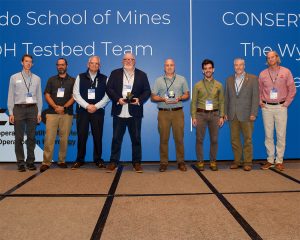
The Cooperative Institute for Research to Operations in Hydrology recently presented its prestigious Research to Operations awards at its third annual Science Meeting in Tuscaloosa, Alabama. The awards recognize individuals or projects that have created a significant impact and bridge the gap between hydrologic research and real-world applications.
During the October 2024 meeting, CIROH Executive Director Dr. Steve Burian presented the R2O awards to Mike Fedoroff and Dr. Andrew Wood, whose projects highlight CIROH’s commitment to research into pathways for operations.
Mike Fedoroff, alongside Leon Crow, the Wyandotte Nation and the CONSERVE Research Group team, received the R2O award for their project on community trust and flood risk management in indigenous communities. This initiative, centered in northeast Oklahoma, was honored for work on a collaborative model that aligns NOAA’s flood risk management strategies with the needs of underserved tribal communities, integrating Indigenous traditional ecological knowledge into hydrologic forecasting.
“It’s an honor, not just for me but for the entire team, to highlight the importance of working with Indigenous communities and making our research relevant to everyday lives,” said Fedoroff, CONSERVE director.
Wood and the Colorado School of Mines CIROH Hydrologic Testbed Team were honored with the R2O award for their contributions to advancing streamflow forecasting. Wood’s team developed a CIROH testbed that forecasts research through real-time simulations, a key innovation for advancing NextGen water forecasting capabilities. This approach enables researchers to measure the effectiveness of new technologies and fosters informed decisions in hydrology operations.
“I’m grateful for this recognition, which reflects the dedicated work of our team and the collaborative spirit within CIROH,” said Wood, research professor of hydrology and water resources management at Mines. “Our goal has been to create a benchmarking system that connects new research with established practices, ensuring our work can make a real difference in forecasting and decision-making.”
The recognition at this year’s meeting reflects CIROH’s ongoing commitment to meaningful, community-oriented hydrology research.
